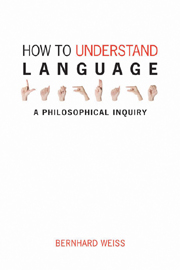Book contents
- Frontmatter
- Contents
- Preface
- 1 The puzzles of language
- 2 The starting-point for analysis
- 3 Analysing sentence-meaning
- 4 Analysing synonymy
- 5 Radical translation
- 6 The structure of a theory of meaning
- 7 Radical interpretation
- 8 Linguistic norms, communication and radical interpretation
- 9 Linguistic normativity
- 10 Radical or robust?
- 11 Language and community
- 12 Rules and privacy: the problem
- 13 Rules and privacy: the solution?
- 14 Truth-conditions versus use-conditions
- Notes
- Bibliography
- Index
1 - The puzzles of language
- Frontmatter
- Contents
- Preface
- 1 The puzzles of language
- 2 The starting-point for analysis
- 3 Analysing sentence-meaning
- 4 Analysing synonymy
- 5 Radical translation
- 6 The structure of a theory of meaning
- 7 Radical interpretation
- 8 Linguistic norms, communication and radical interpretation
- 9 Linguistic normativity
- 10 Radical or robust?
- 11 Language and community
- 12 Rules and privacy: the problem
- 13 Rules and privacy: the solution?
- 14 Truth-conditions versus use-conditions
- Notes
- Bibliography
- Index
Summary
One often hears it remarked that language is a marvellous tool. The metaphor is striking and worth taking seriously, if only because it is so pregnant. In what sense is language a tool? Tools enable or facilitate us to do certain things. What sorts of things do we use language to achieve? What is it about language that, unlike most other tools, it deserves to be marvelled at? Are aspects of the marvelling distinctly philosophical?
Consider a humdrum, familiar tool: a hammer. We use a hammer to achieve a variety of things: to bang in a nail, to drive in a wooden dowel or wedge, to replace the lid on a can of paint, to make a hole in someone's skull or to manipulate a chisel and so on. One might do a huge variety of things with a hammer, many of which were not anticipated by its maker or by the inventor – if there was an inventor – of hammers. But (virtually) every use to which a hammer is put is a function of its use in banging. One might say that the basic function of hammers is to direct an impact to a desired point. Well that, anyway, is my theory of hammers. I lay no great claim to its being correct; we are not interested in hammers here; we are interested in language. What is suggestive in this example is that tools seem to have a variety of uses each of which stems from some basic function.
Information
- Type
- Chapter
- Information
- How to Understand LanguageA Philosophical Inquiry, pp. 1 - 12Publisher: Acumen PublishingPrint publication year: 2009
